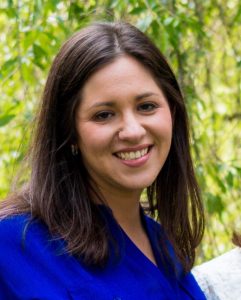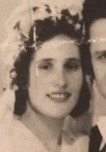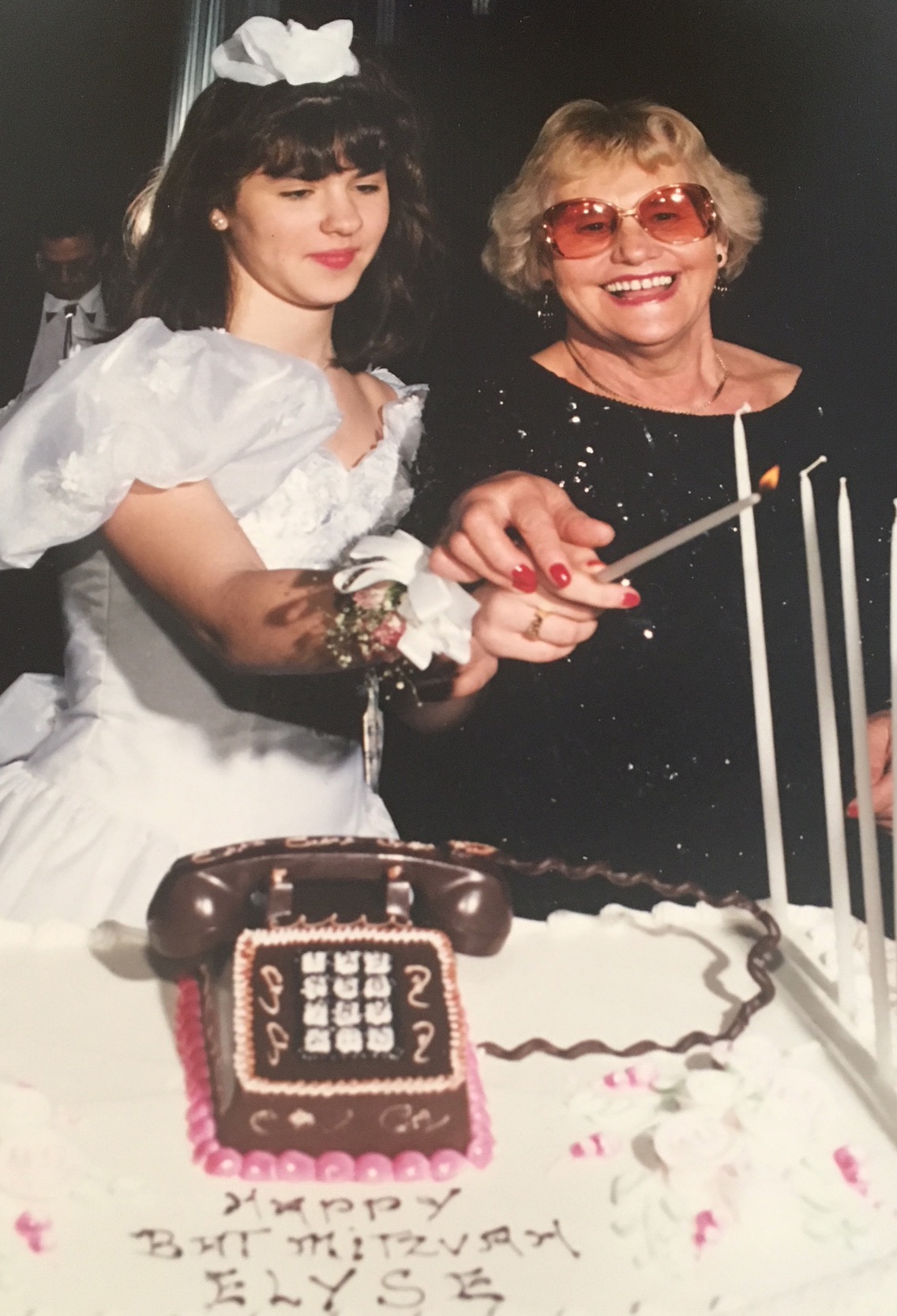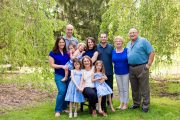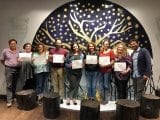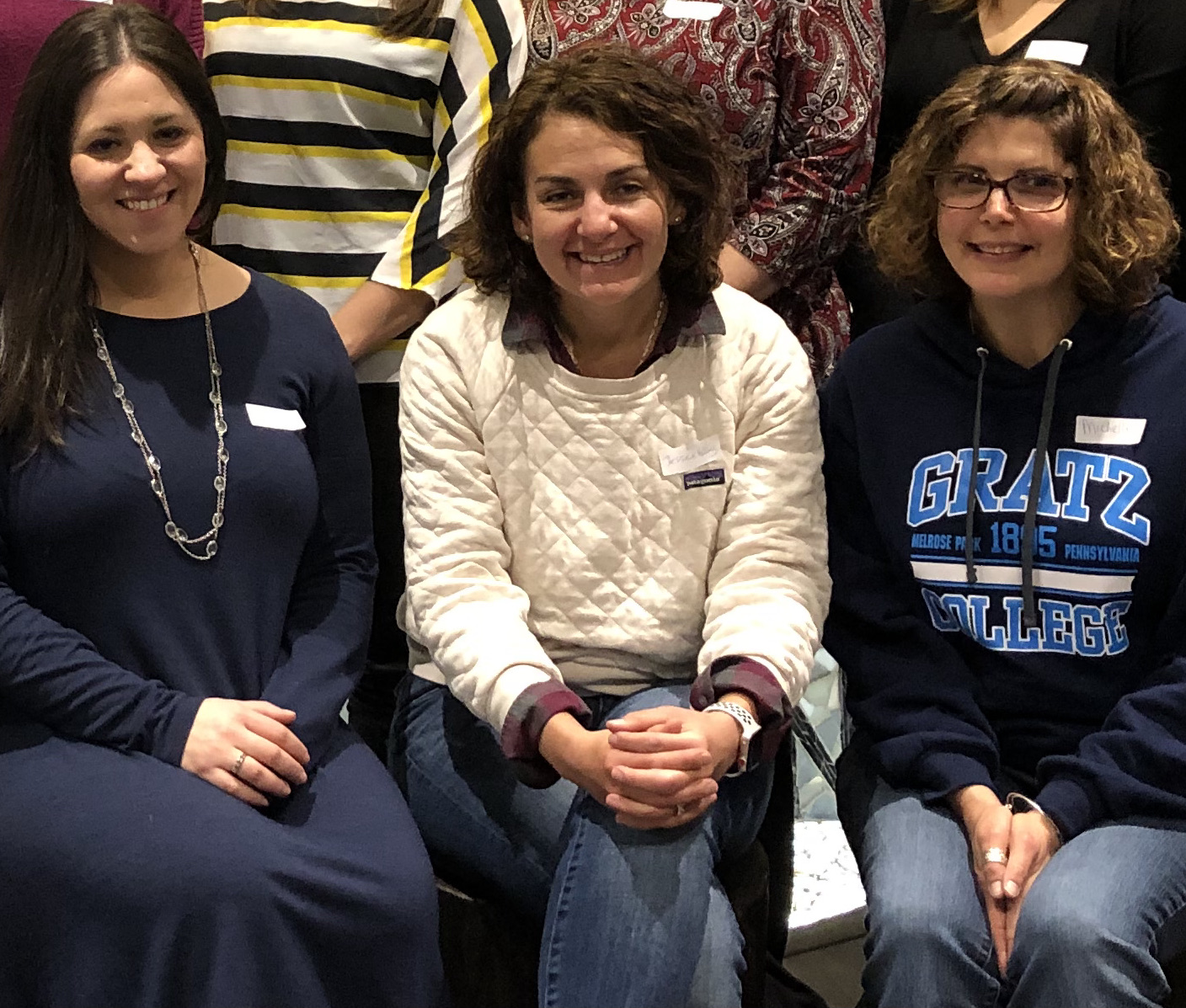REMEMBRANCE BY ELYSE WALLACH WOLFF
Yolan was more than a survivor. She had strength beyond belief. She endured so much pain in her life, from losing her mother at a young age, to her time in the camps to her suffering with cancer. She instilled strength, survivorship, passion and love for family, life and G-d in her family, which is something that both of her granddaughters are now passing on to their children, one of whom is named after Yolan. Her memory is a blessing.
Yolan was the tenth of eleven children born on August 31, 1918 to Hana and Vilmus Moldovan. She was born in Batiz, a mostly Jewish, small farming village right outside of Satu Mare in the region of Transylvania, which was once part of Hungary and now Romania. Yolan’s mother passed away when she was only seven years old and she was raised by her older sisters and her father. Yolan only went to school through the 3rd grade.
Yolan met her husband, Joseph Lichtman (also a survivor), in 1934 when she was only 16 and he was 21 years old. It was love at first sight, but Joseph’s mother disapproved of Yolan because her family was too poor. Despite Joseph’s mother’s disapproval, Yolan and Joseph promised themselves to each other and got engaged in 1940. However, due to Joseph having to finish forced labor and Yolan’s family wanting her to wait for her older sisters to marry before her, Yolan and Joseph did not get married until 1943. Once married, Yolan and Joseph lived in Satu Mare with Joseph’s mother in her house. It was very uncomfortable for Yolan because her mother-in-law did not approve of her, but Yolan’s remained close with her whole family who were all nearby.
When the Germans invaded Hungary, which was late in the war, Yolan and Joseph, as well as their extended families and all of the Jews in the area, were taken to the Satu Mare Ghetto. While in the ghetto, the Germans cut off Yolan’s father’s beard as a way to humiliate him in front of everyone else in the ghetto. Yolan and Joseph were only in the ghetto for a short time before it was liquidated and both were deported to Auschwitz.
Yolan arrived in Auschwitz in 1944 along with her younger sister, Irene, who was sickly. Yolan knew she was pregnant when she arrived at Auschwitz, but since she wasn’t yet showing, when Mengele told all of the pregnant women to step to the side, Yolan did not and instead stayed with Irene. Most likely, all of the pregnant women were either gassed or experimented on by Mengele – a fate that Yolan thankfully avoided. Yolan had told her family about being subjected to the morning count where they would have to stand for hours regardless of the weather. One cold, rainy morning, Yolan had a miscarriage and thanks to the rain, the women around her were able to cover the blood with mud and hide the miscarriage from the SS. This is one of the only stories Yolan told about her time in Auschwitz, and it is amazing that she survived.
Yolan and her sister Irene were sent on a death march from Auschwitz to Theresienstadt. They walked for 86 hours and arrived at Theresienstadt right after the Russian Army had liberated it. Yolan did not speak about liberation, but she then returned to Satu Mare and was reunited with her husband, Joseph, as well as some family members. Of her ten siblings, only four had survived (her sister Irene who she was in the camps with and three brothers) and six of her nieces and nephews survived, some of whom were the sole survivors in their families. Yolan’s father did not survive.
Joseph wanted to go to America, but Yolan did not want to leave her family. They stayed in Satu Mare and started a new life. They had taken in one of Yolan’s nephews, Allen, who was the sole survivor in his family. Yolan and Joseph had their first daughter, Maritza (Marie), on May 16, 1946. In 1948, Yolan and Joseph, together with their daughter and Allen, decided to escape Romania, which was becoming communist as the Russians closed the borders. They were caught at the border (it is believed someone ratted them out) and they were jailed. Yolan was in a Romanian jail for 6 months.
Once out of jail, Yolan and Joseph decided to once again start their lives in Satu Mare. They had a second daughter, Agneta (Aggi), born on April 28, 1952. All of Yolan’s family that remained in the area lived close by and there were always aunts, uncles and cousins around. It was a god life that was simple. No running water or bathrooms, but they had electricity.
In 1962, as Communism and anti-Semitism were on the rise, Yolan and Joseph, together with both of their daughters and Allen, left for Israel with nothing but the clothes on their backs and boarded the Orient Express (a few belongings had been shipped ahead to Israel). The family had some jewelry that they were wearing, but when Yolan witnessed a family being taken off the train because they had hidden jewelry, Yolan removed the jewelry that she and her daughters were wearing threw everything off the train. HIAS was waiting for them in Vienna to take them to Israel, but Joseph wanted to see Paris. Joseph gave the HIAS representatives the tags for the trunks that had been shipped to Israel as proof that they intended to go to Israel. They arrived in Paris and planned to stay for a short while before going to Israel.
While in Paris, Joseph sent a telegraph to his cousin who was living in America (after being liberated from Auschwitz) and the cousin insisted that the family instead go to America. This cousin sponsored the family to go to America. The family went through physical exams in Paris, and a spot was found on Yolan’s lung, likely because she suffered from a severe case of pneumonia a year or two before leaving Romania. America would not let the family come until Yolan was cleared, so they stayed in Paris for 10 months. Yolan and Joseph both took part time jobs illegally to earn money.
The family arrived in America at LaGuardia Airport on November 8, 1962 and settled in Perth Amboy. No one else form Yolan’s family came to America (other than Allen). They had gone to Israel, Australia or Canada after leaving Romania.
On July 4, 1973, while Yolan was on her way to visit two of her brothers in Australia for the first time since they left Romania, Joseph suddenly and tragically had a heart attack and died. Yolan never made it to Australia that trip, but did get to visit her brothers in the early 1990’s.
In 1977, Yolan married a family friend from Romania with the blessing of both of her daughters. They left Perth Amboy and moved to Rego Park, Queens where a number of Romanian friends lived. Yolan’s new husband had a sudden and tragic heart attack after only 10 months of marriage. Yolan stayed in Rego Park until she died in May of 1994 of cancer. Prior to her death she visited her family in Israel a number of times and spent a lot of time in New Jersey visiting with her two granddaughters, Elyse and Rachel, born to Aggi. Yolan adored her granddaughters, often babysitting them, taking them shopping, baking with them and expressing her love for her family any way that she could.
Yolan did not often speak about the war or her time in the ghetto or concentration camps. She did not speak openly about it until her granddaughter asked about the numbers tattooed on her arm, to which she responded that bad people put it there. She only spoke publicly once about her experience, which was in 1993 to Elyse’s 8th grade class. She attended the ground breaking to the Holocaust Museum in DC and slowly opened up about her experiences, but then was diagnosed with cancer and passed away.
REMEMBRANCE BY ELYSE WALLACH WOLFF, GRANDDAUGHTER
Yolan was more than a survivor. She had strength beyond belief. She endured so much pain in her life, from losing her mother at a young age, to her time in the camps to her suffering with cancer. She instilled strength, survivorship, passion and love for family, life and G-d in her family, which is something that both of her granddaughters are now passing on to their children, one of whom is named after Yolan. Her memory is a blessing.
Yolan was the tenth of eleven children born on August 31, 1918 to Hana and Vilmus Moldovan. She was born in Batiz, a mostly Jewish, small farming village right outside of Satu Mare in the region of Transylvania, which was once part of Hungary and now Romania. Yolan’s mother passed away when she was only seven years old and she was raised by her older sisters and her father. Yolan only went to school through the 3rd grade.
Yolan met her husband, Joseph Lichtman (also a survivor), in 1934 when she was only 16 and he was 21 years old. It was love at first sight, but Joseph’s mother disapproved of Yolan because her family was too poor. Despite Joseph’s mother’s disapproval, Yolan and Joseph promised themselves to each other and got engaged in 1940. However, due to Joseph having to finish forced labor and Yolan’s family wanting her to wait for her older sisters to marry before her, Yolan and Joseph did not get married until 1943. Once married, Yolan and Joseph lived in Satu Mare with Joseph’s mother in her house. It was very uncomfortable for Yolan because her mother-in-law did not approve of her, but Yolan’s remained close with her whole family who were all nearby.
When the Germans invaded Hungary, which was late in the war, Yolan and Joseph, as well as their extended families and all of the Jews in the area, were taken to the Satu Mare Ghetto. While in the ghetto, the Germans cut off Yolan’s father’s beard as a way to humiliate him in front of everyone else in the ghetto. Yolan and Joseph were only in the ghetto for a short time before it was liquidated and both were deported to Auschwitz.
Yolan arrived in Auschwitz in 1944 along with her younger sister, Irene, who was sickly. Yolan knew she was pregnant when she arrived at Auschwitz, but since she wasn’t yet showing, when Mengele told all of the pregnant women to step to the side, Yolan did not and instead stayed with Irene. Most likely, all of the pregnant women were either gassed or experimented on by Mengele – a fate that Yolan thankfully avoided. Yolan had told her family about being subjected to the morning count where they would have to stand for hours regardless of the weather. One cold, rainy morning, Yolan had a miscarriage and thanks to the rain, the women around her were able to cover the blood with mud and hide the miscarriage from the SS. This is one of the only stories Yolan told about her time in Auschwitz, and it is amazing that she survived.
Yolan and her sister Irene were sent on a death march from Auschwitz to Theresienstadt. They walked for 86 hours and arrived at Theresienstadt right after the Russian Army had liberated it. Yolan did not speak about liberation, but she then returned to Satu Mare and was reunited with her husband, Joseph, as well as some family members. Of her ten siblings, only four had survived (her sister Irene who she was in the camps with and three brothers) and six of her nieces and nephews survived, some of whom were the sole survivors in their families. Yolan’s father did not survive.
Joseph wanted to go to America, but Yolan did not want to leave her family. They stayed in Satu Mare and started a new life. They had taken in one of Yolan’s nephews, Allen, who was the sole survivor in his family. Yolan and Joseph had their first daughter, Maritza (Marie), on May 16, 1946. In 1948, Yolan and Joseph, together with their daughter and Allen, decided to escape Romania, which was becoming communist as the Russians closed the borders. They were caught at the border (it is believed someone ratted them out) and they were jailed. Yolan was in a Romanian jail for 6 months.
Once out of jail, Yolan and Joseph decided to once again start their lives in Satu Mare. They had a second daughter, Agneta (Aggi), born on April 28, 1952. All of Yolan’s family that remained in the area lived close by and there were always aunts, uncles and cousins around. It was a god life that was simple. No running water or bathrooms, but they had electricity.
In 1962, as Communism and anti-Semitism were on the rise, Yolan and Joseph, together with both of their daughters and Allen, left for Israel with nothing but the clothes on their backs and boarded the Orient Express (a few belongings had been shipped ahead to Israel). The family had some jewelry that they were wearing, but when Yolan witnessed a family being taken off the train because they had hidden jewelry, Yolan removed the jewelry that she and her daughters were wearing threw everything off the train. HIAS was waiting for them in Vienna to take them to Israel, but Joseph wanted to see Paris. Joseph gave the HIAS representatives the tags for the trunks that had been shipped to Israel as proof that they intended to go to Israel. They arrived in Paris and planned to stay for a short while before going to Israel.
While in Paris, Joseph sent a telegraph to his cousin who was living in America (after being liberated from Auschwitz) and the cousin insisted that the family instead go to America. This cousin sponsored the family to go to America. The family went through physical exams in Paris, and a spot was found on Yolan’s lung, likely because she suffered from a severe case of pneumonia a year or two before leaving Romania. America would not let the family come until Yolan was cleared, so they stayed in Paris for 10 months. Yolan and Joseph both took part time jobs illegally to earn money.
The family arrived in America at LaGuardia Airport on November 8, 1962 and settled in Perth Amboy. No one else form Yolan’s family came to America (other than Allen). They had gone to Israel, Australia or Canada after leaving Romania.
On July 4, 1973, while Yolan was on her way to visit two of her brothers in Australia for the first time since they left Romania, Joseph suddenly and tragically had a heart attack and died. Yolan never made it to Australia that trip, but did get to visit her brothers in the early 1990’s.
In 1977, Yolan married a family friend from Romania with the blessing of both of her daughters. They left Perth Amboy and moved to Rego Park, Queens where a number of Romanian friends lived. Yolan’s new husband had a sudden and tragic heart attack after only 10 months of marriage. Yolan stayed in Rego Park until she died in May of 1994 of cancer. Prior to her death she visited her family in Israel a number of times and spent a lot of time in New Jersey visiting with her 2 granddaughters, Elyse and Rachel, born to Aggi. Yolan adored her granddaughters, often babysitting them, taking them shopping, baking with them and expressing her love for her family any way that she could.
Yolan did not often speak about the war or her time in the ghetto or concentration camps. She did not speak openly about it until her granddaughter asked about the numbers tattooed on her arm, to which she responded that bad people put it there. She only spoke publicly once about her experience, which was in 1993 to Elyse’s 8th grade class. She attended the ground breaking to the Holocaust Museum in DC and slowly opened up about her experiences, but then was diagnosed with cancer and passed away.
